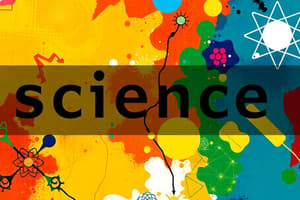Podcast
Questions and Answers
What branch of science focuses on the study of living organisms and life processes?
What branch of science focuses on the study of living organisms and life processes?
- Statistics
- Physics
- Chemistry
- Biology (correct)
Which of the following is NOT a part of the scientific method?
Which of the following is NOT a part of the scientific method?
- Experimentation
- Intuition (correct)
- Conclusion
- Observation
What is the primary focus of social sciences?
What is the primary focus of social sciences?
- Study of abstract concepts
- Study of human behavior and societies (correct)
- Study of physical laws
- Study of natural phenomena
Which of the following appropriately describes a theory in scientific terms?
Which of the following appropriately describes a theory in scientific terms?
What represents a careful procedure to test hypotheses?
What represents a careful procedure to test hypotheses?
Which of the following is a crucial ethical consideration in scientific research?
Which of the following is a crucial ethical consideration in scientific research?
In which branch of science would the study of computation and information systems fall?
In which branch of science would the study of computation and information systems fall?
What is the role of science in relation to policy and decision-making?
What is the role of science in relation to policy and decision-making?
Flashcards are hidden until you start studying
Study Notes
Definition of Science
- Systematic enterprise that builds and organizes knowledge.
- Utilizes empirical methods to understand the natural world.
Branches of Science
- Natural Sciences
- Focus on the study of the natural world.
- Includes:
- Physics: Study of matter, energy, and their interactions.
- Chemistry: Study of substances, their properties, and reactions.
- Biology: Study of living organisms and life processes.
- Earth Sciences: Study of the Earth, its processes, and its atmosphere.
- Formal Sciences
- Study of abstract concepts and logical structures.
- Includes:
- Mathematics: Study of numbers, quantities, and shapes.
- Statistics: Study of data collection, analysis, interpretation.
- Computer Science: Study of computation and information systems.
- Social Sciences
- Study of human behavior and societies.
- Includes:
- Psychology: Study of mind and behavior.
- Sociology: Study of social behavior and society.
- Economics: Study of production, distribution, and consumption of goods.
Scientific Method
- A systematic approach to inquiry involving:
- Observation: Gathering information about a phenomenon.
- Hypothesis: Formulating a testable explanation.
- Experimentation: Conducting tests to validate or refute the hypothesis.
- Analysis: Interpreting data collected during experiments.
- Conclusion: Drawing inferences based on the analysis.
- Communication: Sharing results with the scientific community.
Importance of Science
- Drives technological advancements and innovation.
- Informs policy and decision-making.
- Enhances understanding of health, environment, and society.
- Encourages critical thinking and problem-solving skills.
Key Concepts in Science
- Theory: A well-substantiated explanation of an aspect of the natural world.
- Law: A statement based on repeated experimental observations that describes some aspect of the universe.
- Hypothesis: A proposed explanation for a phenomenon, subject to testing.
- Experiment: A controlled procedure to test hypotheses.
Ethical Considerations
- Importance of ethics in scientific research.
- Issues include:
- Integrity: Honesty in reporting data and results.
- Respect for subjects: Ensuring the welfare of human and animal participants.
- Environmental responsibility: Considering the impact of research on ecosystems.
Definition of Science
- Science is a systematic enterprise aimed at building and organizing knowledge.
- It employs empirical methods to explore and understand the natural world.
Branches of Science
-
Natural Sciences
- Concentrate on studying the natural world and its components.
- Includes:
- Physics: Explores matter, energy, and their interactions.
- Chemistry: Investigates substances, their properties, and chemical reactions.
- Biology: Examines living organisms and their life processes.
- Earth Sciences: Studies the Earth, its processes, and the atmosphere.
-
Formal Sciences
- Focus on the study of abstract concepts and logical structures.
- Includes:
- Mathematics: Analyzes numbers, quantities, and geometric shapes.
- Statistics: Involves data collection, analysis, and interpretation.
- Computer Science: Explores computation and information systems.
-
Social Sciences
- Study human behavior and societal interactions.
- Includes:
- Psychology: Looks at the mind and behavioral patterns.
- Sociology: Studies social behavior and group dynamics.
- Economics: Analyzes the production, distribution, and consumption of goods.
Scientific Method
- A structured approach to inquiry characterized by several stages:
- Observation: Collecting information about a phenomenon.
- Hypothesis: Proposing a testable explanation.
- Experimentation: Conducting tests to validate or refute the hypothesis.
- Analysis: Interpreting data obtained from experiments.
- Conclusion: Making inferences based on the analysis.
- Communication: Sharing findings with the broader scientific community.
Importance of Science
- Catalyzes technological advancements and innovations in various fields.
- Guides policy formulation and decision-making processes.
- Deepens understanding of health, environmental issues, and societal dynamics.
- Fosters critical thinking and enhances problem-solving abilities.
Key Concepts in Science
- Theory: A robust explanation of a specific aspect of the natural world, supported by evidence.
- Law: Descriptive statements based on consistent experimental observations regarding the universe.
- Hypothesis: A proposed explanation for an observed phenomenon, subject to empirical testing.
- Experiment: A controlled method designed to test hypotheses in a scientific context.
Ethical Considerations
- Ethics play a crucial role in scientific research and inquiry.
- Significant issues include:
- Integrity: Commitment to honesty in data reporting and research results.
- Respect for subjects: Prioritizing the welfare of human and animal participants in studies.
- Environmental responsibility: Assessing and minimizing the ecological impact of scientific research.
Studying That Suits You
Use AI to generate personalized quizzes and flashcards to suit your learning preferences.




